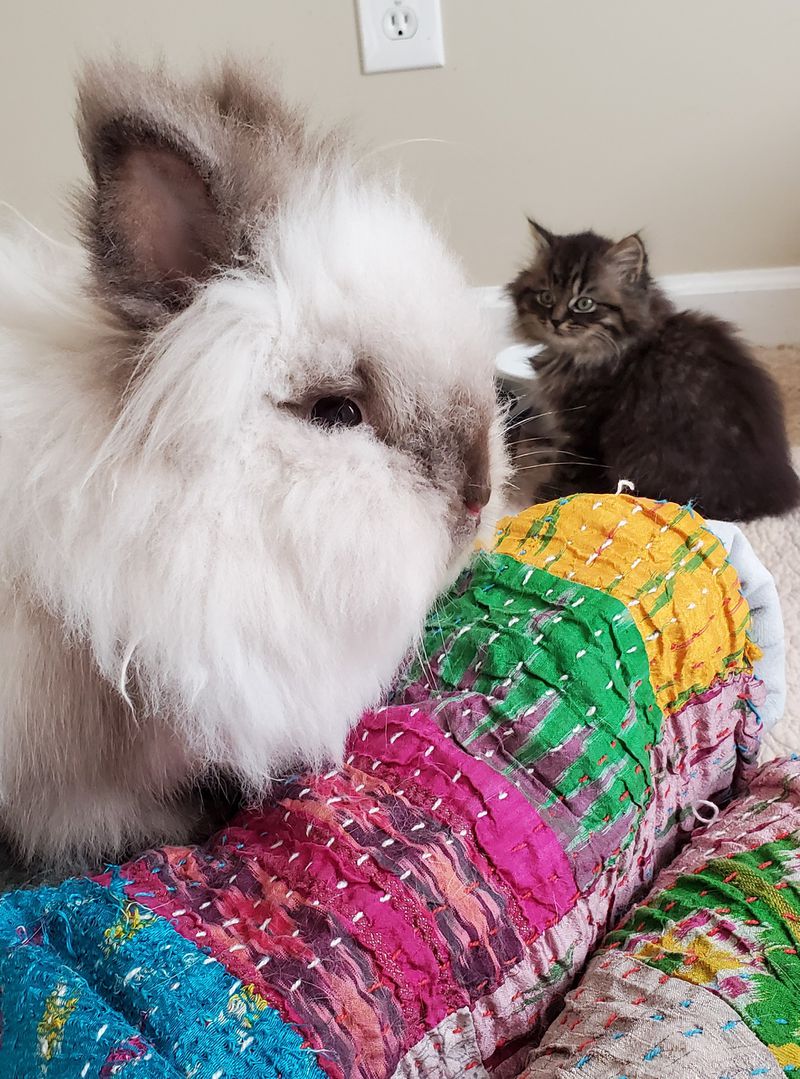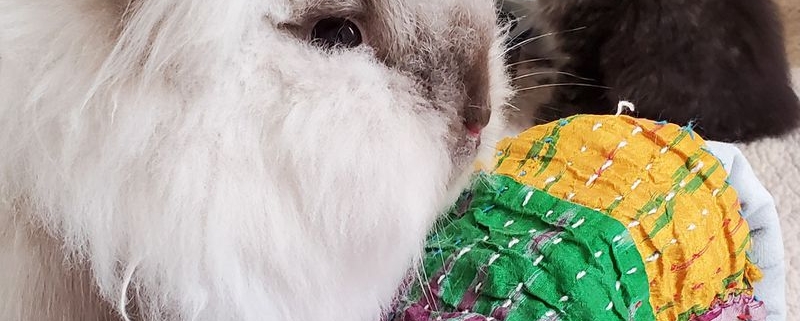With proper care, rabbits can make great pets
Animal Connections
Published by the Virginian Pilot on 7-7-2021
Written by Lacy Shirey, Chesapeake Humane Society Executive Director
In the past two decades, rabbits have become the third most popular companion animal, after cats and dogs.
They can make great pets. However, they are a big commitment, so do your research beforehand to make sure it’s a good fit for your household.

Lola, a Double-maned Lionhead rabbit, enjoys the company of a kitten. If carefully socialized, rabbits can be a great addition to a multi-pet household. Courtesy of Kimberly Sherlaw
Rabbits are intelligent, inquisitive and social creatures, but they require daily interaction, a specific diet and regular veterinarian checkups. The Rabbit Welfare Association is an excellent resource for rabbit owners; it succinctly sums up the commitment required with its slogan, “A hutch is not enough.”
Kimberly Sherlaw, executive director of the Norfolk SPCA, has shared her home with rabbits for the past 16 years. She adopted her first companion rabbit in 2005 just as she entered the field of animal welfare.
“I was exposed to the number of unwanted and neglected rabbits surrendered to shelters,” she said. “It was apparent that there was a lack of knowledge about their care and behaviors. Both concerned and curious about this challenge in sheltering, I decided to adopt my first rabbit, a Holland Lop, fondly named William, and this is where my love for rabbits began.”
Sherlaw advises first-time rabbit owners do thorough research first. Rabbits need to carry out their natural behaviors, including running, jumping, digging and foraging. They are social animals, so they enjoy the company of other rabbits in addition to daily human interaction.
Rabbits also have special dietary needs. A proper diet consists of timothy hay supplemented with pellets and fresh fruits and vegetables.
Proper enrichment is essential for a happy and healthy rabbit. Sherlaw recommends toys and chews such as applewood sticks or willow branch balls to help keep their ever-growing teeth worn down.
Paper bags, cardboard boxes or boxes filled with shredded paper and treats are great ways to fulfill a rabbit’s curiosity, allowing them to explore, forage, scratch and chew. Or fill a paper towel or toilet paper roll with hay to give them more exciting challenges.
“A proper diet and proper enrichment are the key factors that help you build a friendship and trust with your rabbit,” Sherlaw said.
Rabbits require regular veterinary care, just like cats and dogs. You’ll need to seek out a veterinarian that specializes in small animals or exotics, as rabbits will need annual checkups and vaccinations.
The idiom “reproduce like rabbits” exists for a good reason. Rabbits can produce a large number of offspring very rapidly.
Because they are prey animals, this high fecundity rate serves them well in the wild and ensures their existence. But as a household pet, your rabbit should be spayed or neutered. In addition to unplanned litters, spaying and neutering reduces unwanted behaviors and can extend their lifespan by reducing risks of certain cancers.
If you are ready to add a rabbit to your family, please consider your local animal shelter. Adopting from a shelter or rescue ensures your rabbit is spayed or neutered, and they often have bonded pairs that are ready to go home together.
Just last month Virginia Beach Animal Care and Adoption Center took in 150 domestic rabbits from a household. These rabbits are friendly and used to being handled, so it’s the perfect time to adopt if a rabbit is a good fit for your home.
Local shelters regularly house rabbits and other small animals for adoption, including Chesapeake Animal Services, Chesapeake Humane Society, Norfolk Animal Care Center, Norfolk SPCA, Portsmouth Humane Society and Virginia Beach SPCA.
Please refrain from purchasing rabbits from pet stores. Similar to the puppy mill industry, pet stores source from pet trade breeders with inhumane practices, mass breeding rabbits in small, dirty cages. Pets that come from pet stores often don’t have access to proper nutrition or veterinary care. Shelters, rescues and reputable breeders are your best resource.

